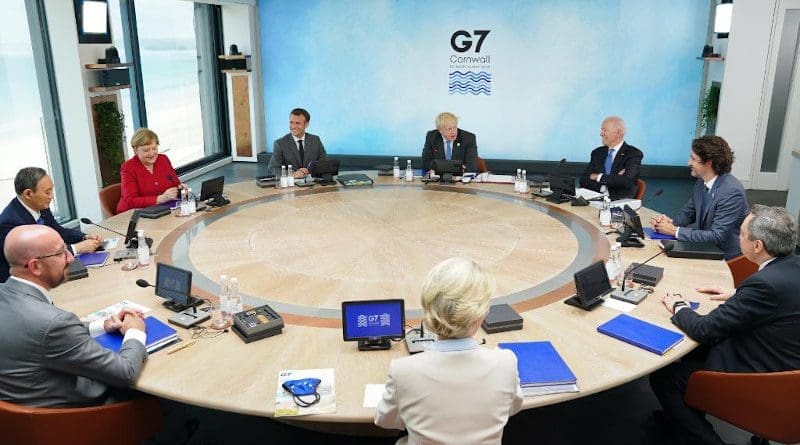The Imperialist Nature Of G7 – OpEd
By Yanis Iqbal
The 2021 summit of the Group of Seven (G7) – lasting from June 11 to 13 – was held at Cornwall, a south-west England holiday destination. Bland globalism and insipid liberalism dominated the agenda on both pandemic and climate change. “Carbis Bay Declaration”– intended as a statement on the health situation – asserted that the “G7 is uniquely well-placed to lead global efforts in pandemic prevention – the group is home to two-thirds of the world’s pharmaceutical market and the four coronavirus vaccines licensed for use in the UK were all developed in G7 nations (the UK, US and Germany).” The concentration of medical resources in a few rich nations is not a thing to be proud of. In fact, this monopolist pattern has manifested itself in vaccine imperialism – the unequal distribution of COVID-19 vaccines on economic lines. Instead of facilitating a substantive dialogue over the suspension of intellectual property rights related to COVID-19, G7 nations have been content to make measly donation pledges, treating the poorer nations as passive subjects of philanthropy.
“The New Atlantic Charter” – proposed by US President Joe Biden and British Prime Minister Boris Johnson as an updated version of the World War II-era “Atlantic Charter” – says: “we commit to continue building an inclusive, fair, climate-friendly, sustainable, rules-based global economy for the 21st century…the world has reached a critical point where it must act urgently and ambitiously to tackle the climate crisis, protect biodiversity, and sustain nature. Our countries will prioritise these issues in all our international action.” This vague statement has translated into the absence of any action aimed at ending the environmental catastrophe. According to an article published in “The Conversation”, 51% of the G7’s COVID-19 economic recovery fund – amounting to $189 billion – paid between January 2020 and March 2021 was allocated as financial aid for the fossil fuel industry. Further, $8 of every $10 dedicated to non-renewable energy was paid with no conditions on these companies to reduce their emissions. Understandably, hundreds of environmental protesters took to the Cornish seaside in a bid to wake up their insensitive rulers.
Why does the G7 take a reactionary stance on the pressing issues of our times? The answer to this may be found in the origins of the organization. In the words of Jason Hickel, “The thing about the G7 is that they are basically a mafia of imperialist powers who dominate global arms sales, habitually coup progressive governments in the South, prop up right-wing dictatorships, and are responsible for 77% of excess emissions. It doesn’t exactly inspire trust.” On November 15, 1975, the leaders of the newly formed G7 met at Chateau de Rambouillet, the French President’s summer residence located thirty miles southwest of Paris. The G7 had formed two years earlier when George Schultz, then US Treasury Secretary, had invited his counterparts from France, UK, and West Germany to calibrate economic policy among the allies.
American President Gerald Ford opened the Rambouillet discussion with a plea to the leaders “to ensure that the current world economic situation is not seen as a crisis in the democratic or capitalist system.” Ford’s concerns about the legitimacy of capitalism were intimately linked to a strong Third World Movement, which had turned the UN General Assembly into a veritable forum for airing the grievances of the Global South. The audacious New International Economic Organization (NIEO) document – a proposal for restructuring the global economy in a more democratic and equitable fashion for South development – and the defiant 1967 and 1973 oil embargos by member nations of the Organization of Petroleum Countries (OPEC) had greatly perturbed the Global North. The Atlantic world – under the de facto intellectual tutelage of Henry Kissinger – used G7 as a means to discuss and design a counter-attack to the challenges from the South.
The result was a series of multi-pronged shenanigans: takeover of the United Nations Conference on Trade and Development (UNCTAD), conversion of the UN Security Council into a mere executive appendage of the UN, disruption of the fragile unity between the Non-Aligned Movement (NAM) and the OPEC, and the ejection of Keynesians and developmentalists from international bodies like the UN, the International Monetary Fund (IMF), and the World Bank (WB). Actions on the diplomatic and policy front went hand in hand with assaults on anti-imperialist governments in the South. Four revolutions in the late 1970s – Angola, Afghanistan, Iran, and Nicaragua – forced aggressive militarism out of the woodwork, and all UN discussions became subordinated to the arms of the Global North.
After the fall of the USSR and collapse of the Third World Project, G7 became an integral component of the US-led international order. In line with the wishes of the financial oligarchy, the group leaves no stone unturned in ensuring that the Southern countries carry out financial liberalization, privatization, deregulated marketization, and free exchange in capital projects so as to facilitate inward and outward flows of globally mobile “hot money.” While G7 acts a coordination platform for major powers, the IMF, the WB, and the World Trade Organization (WTO) serve as functional bodies for the execution of agreed policies. North Atlantic Treaty Organization (NATO) militarily underpins this politico-economic alliance, thus providing a security shield to the developed countries. As is evident, G7 promotes a highly uneven and undemocratic system. It represents only 10% of the world’s population yet enjoys disproportionate influence over world affairs. Blind to the plight of the impoverished masses, it keeps issuing imperialist declarations – and the world is merely called upon to support them. The current summit is another instance of this unwanted exercise.

